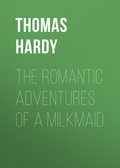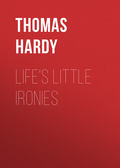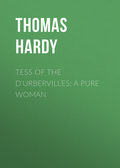полная версия

Томас Харди (Гарди)
Time's Laughingstocks, and Other Verses
THE RASH BRIDE
An Experience of the Mellstock Quire
I
We Christmas-carolled down the Vale, and up the Vale, and round the Vale,
We played and sang that night as we were yearly wont to do —
A carol in a minor key, a carol in the major D,
Then at each house: “Good wishes: many Christmas joys to you!”
II
Next, to the widow’s John and I and all the rest drew on. And I
Discerned that John could hardly hold the tongue of him for joy.
The widow was a sweet young thing whom John was bent on marrying,
And quiring at her casement seemed romantic to the boy.
III
“She’ll make reply, I trust,” said he, “to our salute? She must!” said he,
“And then I will accost her gently – much to her surprise! —
For knowing not I am with you here, when I speak up and call her dear
A tenderness will fill her voice, a bashfulness her eyes.
IV
So, by her window-square we stood; ay, with our lanterns there we stood,
And he along with us, – not singing, waiting for a sign;
And when we’d quired her carols three a light was lit and out looked she,
A shawl about her bedgown, and her colour red as wine.
V
And sweetly then she bowed her thanks, and smiled, and spoke aloud her thanks;
When lo, behind her back there, in the room, a man appeared.
I knew him – one from Woolcomb way – Giles Swetman – honest as the day,
But eager, hasty; and I felt that some strange trouble neared.
VI
“How comes he there?.. Suppose,” said we, “she’s wed of late! Who knows?” said we.
– “She married yester-morning – only mother yet has known
The secret o’t!” shrilled one small boy. “But now I’ve told, let’s wish ’em joy!”
A heavy fall aroused us: John had gone down like a stone.
VII
We rushed to him and caught him round, and lifted him, and brought him round,
When, hearing something wrong had happened, oped the window she:
“Has one of you fallen ill?” she asked, “by these night labours overtasked?”
None answered. That she’d done poor John a cruel turn felt we.
VIII
Till up spoke Michael: “Fie, young dame! You’ve broke your promise, sly young dame,
By forming this new tie, young dame, and jilting John so true,
Who trudged to-night to sing to ’ee because he thought he’d bring to ’ee
Good wishes as your coming spouse. May ye such trifling rue!”
IX
Her man had said no word at all; but being behind had heard it all,
And now cried: “Neighbours, on my soul I knew not ’twas like this!”
And then to her: “If I had known you’d had in tow not me alone,
No wife should you have been of mine. It is a dear bought bliss!”
X
She changed death-white, and heaved a cry: we’d never heard so grieved a cry
As came from her at this from him: heart-broken quite seemed she;
And suddenly, as we looked on, she turned, and rushed; and she was gone,
Whither, her husband, following after, knew not; nor knew we.
XI
We searched till dawn about the house; within the house, without the house,
We searched among the laurel boughs that grew beneath the wall,
And then among the crocks and things, and stores for winter junketings,
In linhay, loft, and dairy; but we found her not at all.
XII
Then John rushed in: “O friends,” he said, “hear this, this, this!” and bends his head:
“I’ve – searched round by the —well, and find the cover open wide!
I am fearful that – I can’t say what.. Bring lanterns, and some cords to knot.”
We did so, and we went and stood the deep dark hole beside.
XIII
And then they, ropes in hand, and I – ay, John, and all the band, and I
Let down a lantern to the depths – some hundred feet and more;
It glimmered like a fog-dimmed star; and there, beside its light, afar,
White drapery floated, and we knew the meaning that it bore.
XIV
The rest is naught.. We buried her o’ Sunday. Neighbours carried her;
And Swetman – he who’d married her – now miserablest of men,
Walked mourning first; and then walked John; just quivering, but composed anon;
And we the quire formed round the grave, as was the custom then.
XV
Our old bass player, as I recall – his white hair blown – but why recall! —
His viol upstrapped, bent figure – doomed to follow her full soon —
Stood bowing, pale and tremulous; and next to him the rest of us.
We sang the Ninetieth Psalm to her – set to Saint Stephen’s tune.
THE DEAD QUIRE
I
Beside the Mead of Memories,
Where Church-way mounts to Moaning Hill,
The sad man sighed his phantasies:
He seems to sigh them still.
II
“’Twas the Birth-tide Eve, and the hamleteers
Made merry with ancient Mellstock zest,
But the Mellstock quire of former years
Had entered into rest.
III
“Old Dewy lay by the gaunt yew tree,
And Reuben and Michael a pace behind,
And Bowman with his family
By the wall that the ivies bind.
IV
“The singers had followed one by one,
Treble, and tenor, and thorough-bass;
And the worm that wasteth had begun
To mine their mouldering place.
V
“For two-score years, ere Christ-day light,
Mellstock had throbbed to strains from these;
But now there echoed on the night
No Christmas harmonies.
VI
“Three meadows off, at a dormered inn,
The youth had gathered in high carouse,
And, ranged on settles, some therein
Had drunk them to a drowse.
VII
“Loud, lively, reckless, some had grown,
Each dandling on his jigging knee
Eliza, Dolly, Nance, or Joan —
Livers in levity.
VIII
“The taper flames and hearthfire shine
Grew smoke-hazed to a lurid light,
And songs on subjects not divine
Were warbled forth that night.
IX
“Yet many were sons and grandsons here
Of those who, on such eves gone by,
At that still hour had throated clear
Their anthems to the sky.
X
“The clock belled midnight; and ere long
One shouted, ‘Now ’tis Christmas morn;
Here’s to our women old and young,
And to John Barleycorn!’
XI
“They drink the toast and shout again:
The pewter-ware rings back the boom,
And for a breath-while follows then
A silence in the room.
XII
“When nigh without, as in old days,
The ancient quire of voice and string
Seemed singing words of prayer and praise
As they had used to sing:
XIII
“‘While shepherds watch’d their flocks by night,’ —
Thus swells the long familiar sound
In many a quaint symphonic flight —
To, ‘Glory shone around.’
XIV
“The sons defined their fathers’ tones,
The widow his whom she had wed,
And others in the minor moans
The viols of the dead.
XV
“Something supernal has the sound
As verse by verse the strain proceeds,
And stilly staring on the ground
Each roysterer holds and heeds.
XVI
“Towards its chorded closing bar
Plaintively, thinly, waned the hymn,
Yet lingered, like the notes afar
Of banded seraphim.
XVII
“With brows abashed, and reverent tread,
The hearkeners sought the tavern door:
But nothing, save wan moonlight, spread
The empty highway o’er.
XVIII
“While on their hearing fixed and tense
The aerial music seemed to sink,
As it were gently moving thence
Along the river brink.
XIX
“Then did the Quick pursue the Dead
By crystal Froom that crinkles there;
And still the viewless quire ahead
Voiced the old holy air.
XX
“By Bank-walk wicket, brightly bleached,
It passed, and ’twixt the hedges twain,
Dogged by the living; till it reached
The bottom of Church Lane.
XXI
“There, at the turning, it was heard
Drawing to where the churchyard lay:
But when they followed thitherward
It smalled, and died away.
XXII
“Each headstone of the quire, each mound,
Confronted them beneath the moon;
But no more floated therearound
That ancient Birth-night tune.
XXIII
“There Dewy lay by the gaunt yew tree,
There Reuben and Michael, a pace behind,
And Bowman with his family
By the wall that the ivies bind.
XXIV
“As from a dream each sobered son
Awoke, and musing reached his door:
’Twas said that of them all, not one
Sat in a tavern more.”
XXV
– The sad man ceased; and ceased to heed
His listener, and crossed the leaze
From Moaning Hill towards the mead —
The Mead of Memories.
1897.
THE CHRISTENING
Whose child is this they bring
Into the aisle? —
At so superb a thing
The congregation smile
And turn their heads awhile.
Its eyes are blue and bright,
Its cheeks like rose;
Its simple robes unite
Whitest of calicoes
With lawn, and satin bows.
A pride in the human race
At this paragon
Of mortals, lights each face
While the old rite goes on;
But ah, they are shocked anon.
What girl is she who peeps
From the gallery stair,
Smiles palely, redly weeps,
With feverish furtive air
As though not fitly there?
“I am the baby’s mother;
This gem of the race
The decent fain would smother,
And for my deep disgrace
I am bidden to leave the place.”
“Where is the baby’s father?” —
“In the woods afar.
He says there is none he’d rather
Meet under moon or star
Than me, of all that are.
“To clasp me in lovelike weather,
Wish fixing when,
He says: To be together
At will, just now and then,
Makes him the blest of men;
“But chained and doomed for life
To slovening
As vulgar man and wife,
He says, is another thing:
Yea: sweet Love’s sepulchring!”
1904.
A DREAM QUESTION
“It shall be dark unto you, that ye shall not divine.”
Micah iii. 6.
I asked the Lord: “Sire, is this true
Which hosts of theologians hold,
That when we creatures censure you
For shaping griefs and ails untold
(Deeming them punishments undue)
You rage, as Moses wrote of old?
When we exclaim: ‘Beneficent
He is not, for he orders pain,
Or, if so, not omnipotent:
To a mere child the thing is plain!’
Those who profess to represent
You, cry out: ‘Impious and profane!’”
He: “Save me from my friends, who deem
That I care what my creatures say!
Mouth as you list: sneer, rail, blaspheme,
O manikin, the livelong day,
Not one grief-groan or pleasure-gleam
Will you increase or take away.
“Why things are thus, whoso derides,
May well remain my secret still.
A fourth dimension, say the guides,
To matter is conceivable.
Think some such mystery resides
Within the ethic of my will.”
BY THE BARROWS
Not far from Mellstock – so tradition saith —
Where barrows, bulging as they bosoms were
Of Multimammia stretched supinely there,
Catch night and noon the tempest’s wanton breath,
A battle, desperate doubtless unto death,
Was one time fought. The outlook, lone and bare,
The towering hawk and passing raven share,
And all the upland round is called “The He’th.”
Here once a woman, in our modern age,
Fought singlehandedly to shield a child —
One not her own – from a man’s senseless rage.
And to my mind no patriots’ bones there piled
So consecrate the silence as her deed
Of stoic and devoted self-unheed.
A WIFE AND ANOTHER
“War ends, and he’s returning
Early; yea,
The evening next to-morrow’s!” —
– This I say
To her, whom I suspiciously survey,
Holding my husband’s letter
To her view. —
She glanced at it but lightly,
And I knew
That one from him that day had reached her too.
There was no time for scruple;
Secretly
I filched her missive, conned it,
Learnt that he
Would lodge with her ere he came home to me.
To reach the port before her,
And, unscanned,
There wait to intercept them
Soon I planned:
That, in her stead, I might before him stand.
So purposed, so effected;
At the inn
Assigned, I found her hidden: —
O that sin
Should bear what she bore when I entered in!
Her heavy lids grew laden
With despairs,
Her lips made soundless movements
Unawares,
While I peered at the chamber hired as theirs.
And as beside its doorway,
Deadly hued,
One inside, one withoutside
We two stood,
He came – my husband – as she knew he would.
No pleasurable triumph
Was that sight!
The ghastly disappointment
Broke them quite.
What love was theirs, to move them with such might!
“Madam, forgive me!” said she,
Sorrow bent,
“A child – I soon shall bear him.
Yes – I meant
To tell you – that he won me ere he went.”
Then, as it were, within me
Something snapped,
As if my soul had largened:
Conscience-capped,
I saw myself the snarer – them the trapped.
“My hate dies, and I promise,
Grace-beguiled,”
I said, “to care for you, be
Reconciled;
And cherish, and take interest in the child.”
Without more words I pressed him
Through the door
Within which she stood, powerless
To say more,
And closed it on them, and downstairward bore.
“He joins his wife – my sister,”
I, below,
Remarked in going – lightly —
Even as though
All had come right, and we had arranged it so.
As I, my road retracing,
Left them free,
The night alone embracing
Childless me,
I held I had not stirred God wrothfully.
THE ROMAN ROAD
The Roman Road runs straight and bare
As the pale parting-line in hair
Across the heath. And thoughtful men
Contrast its days of Now and Then,
And delve, and measure, and compare;
Visioning on the vacant air
Helmed legionaries, who proudly rear
The Eagle, as they pace again
The Roman Road.
But no tall brass-helmed legionnaire
Haunts it for me. Uprises there
A mother’s form upon my ken,
Guiding my infant steps, as when
We walked that ancient thoroughfare,
The Roman Road.
THE VAMPIRINE FAIR
Gilbert had sailed to India’s shore,
And I was all alone:
My lord came in at my open door
And said, “O fairest one!”
He leant upon the slant bureau,
And sighed, “I am sick for thee!”
“My lord,” said I, “pray speak not so,
Since wedded wife I be.”
Leaning upon the slant bureau,
Bitter his next words came:
“So much I know; and likewise know
My love burns on the same!
“But since you thrust my love away,
And since it knows no cure,
I must live out as best I may
The ache that I endure.”
When Michaelmas browned the nether Coomb,
And Wingreen Hill above,
And made the hollyhocks rags of bloom,
My lord grew ill of love.
My lord grew ill with love for me;
Gilbert was far from port;
And – so it was – that time did see
Me housed at Manor Court.
About the bowers of Manor Court
The primrose pushed its head
When, on a day at last, report
Arrived of him I had wed.
“Gilbert, my lord, is homeward bound,
His sloop is drawing near,
What shall I do when I am found
Not in his house but here?”
“O I will heal the injuries
I’ve done to him and thee.
I’ll give him means to live at ease
Afar from Shastonb’ry.”
When Gilbert came we both took thought:
“Since comfort and good cheer,”
Said he, “So readily are bought,
He’s welcome to thee, Dear.”
So when my lord flung liberally
His gold in Gilbert’s hands,
I coaxed and got my brothers three
Made stewards of his lands.
And then I coaxed him to install
My other kith and kin,
With aim to benefit them all
Before his love ran thin.
And next I craved to be possessed
Of plate and jewels rare.
He groaned: “You give me, Love, no rest,
Take all the law will spare!”
And so in course of years my wealth
Became a goodly hoard,
My steward brethren, too, by stealth
Had each a fortune stored.
Thereafter in the gloom he’d walk,
And by and by began
To say aloud in absent talk,
“I am a ruined man! —
“I hardly could have thought,” he said,
“When first I looked on thee,
That one so soft, so rosy red,
Could thus have beggared me!”
Seeing his fair estates in pawn,
And him in such decline,
I knew that his domain had gone
To lift up me and mine.
Next month upon a Sunday morn
A gunshot sounded nigh:
By his own hand my lordly born
Had doomed himself to die.
“Live, my dear lord, and much of thine
Shall be restored to thee!”
He smiled, and said ’twixt word and sign,
“Alas – that cannot be!”
And while I searched his cabinet
For letters, keys, or will,
’Twas touching that his gaze was set
With love upon me still.
And when I burnt each document
Before his dying eyes,
’Twas sweet that he did not resent
My fear of compromise.
The steeple-cock gleamed golden when
I watched his spirit go:
And I became repentant then
That I had wrecked him so.
Three weeks at least had come and gone,
With many a saddened word,
Before I wrote to Gilbert on
The stroke that so had stirred.
And having worn a mournful gown,
I joined, in decent while,
My husband at a dashing town
To live in dashing style.
Yet though I now enjoy my fling,
And dine and dance and drive,
I’d give my prettiest emerald ring
To see my lord alive.
And when the meet on hunting-days
Is near his churchyard home,
I leave my bantering beaux to place
A flower upon his tomb;
And sometimes say: “Perhaps too late
The saints in Heaven deplore
That tender time when, moved by Fate,
He darked my cottage door.”





